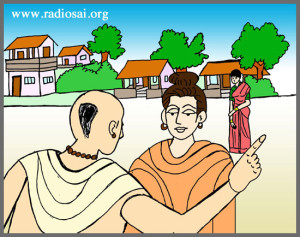The Story of Ramu
Once there lived a boy called Ramu. One day, he stole a book from one of his classmates. Instead of punishing him, his mother appreciated him. She said, “That was so clever, my boy.”
As Ramu grew older, he came to be known as the village thief. One day, the police caught him, and he was sentenced to be hanged.
The Day of Execution
On the day of his execution, his mother was beating her chest and crying. Ramu saw his mother in the crowd and pleaded with the guards to allow him to speak his last words to her. When he was close, Ramu bit his mother’s ear. The people were shocked and asked him why he did such a thing.
Ramu’s Explanation
Ramu replied, “That lady is my mother. Because of her, I am going to be hanged now. When I was small and did mischief, she encouraged me instead of correcting me. If she had controlled my behavior in the beginning, I would not have met this end.”
Moral of the Story
If wealth is lost, nothing is lost. If health is lost, something is lost. But if character is lost, everything is lost.
We should keep a constant check on our behavior and remove the weeds of bad habits from the beginning. If left unchecked, these bad habits will grow strong and become difficult to uproot later.
Insights from Srimad Bhagavatam
In Srimad Bhagavatam, Kamsa’s ministers advise him on the need to take immediate action against enemies, saying in verse 10.4.38:
yathaamayo ‘nge samupekshito nrbhir na shakyate rudha padash cikitsitum yathendriya graama upekshitas tathaa ripur mahaan baddha balo na caalyate
“As a disease, if initially neglected, becomes acute and impossible to cure, or as the senses, if not controlled at first, are impossible to control later, an enemy, if neglected in the beginning, later becomes insurmountable.”
Reflection
Just as early detection makes it easier to cure diseases like cancer, early correction of bad habits is essential. If we allow bad habits such as intoxication, loose-talk, laziness, or getting up late to take root, they will drag us down. Habits are hard to break, which is why it’s crucial to train our senses from the beginning.
Controlling the Mind and Senses
The phrase “yathendriya-graama upekshitas” in the verse emphasizes the importance of controlling our senses. If we let our senses loose, it will be difficult to rein them in later. If we don’t control the mind and senses by steady intelligence, they will become our masters and drag us in different directions, ultimately leading to suffering.
The Importance of Good Habits
Habits, whether good or bad, are formed through repetition. An act repeated becomes a habit, and habits shape our character. It is vital to cultivate good habits from a young age. The saying goes, “We sow an act, we reap a habit; we sow a habit, we reap a character.” The habits we form in our early years ultimately define our character.
Conclusion
The story of Ramu teaches us the critical importance of early correction and the cultivation of good habits. Just as Ramu’s unchecked behavior led to his tragic end, neglecting to address bad habits early can lead to dire consequences. Let us strive to form and maintain good habits, ensuring that our character remains strong and virtuous.



